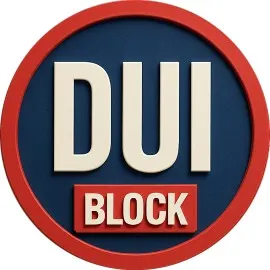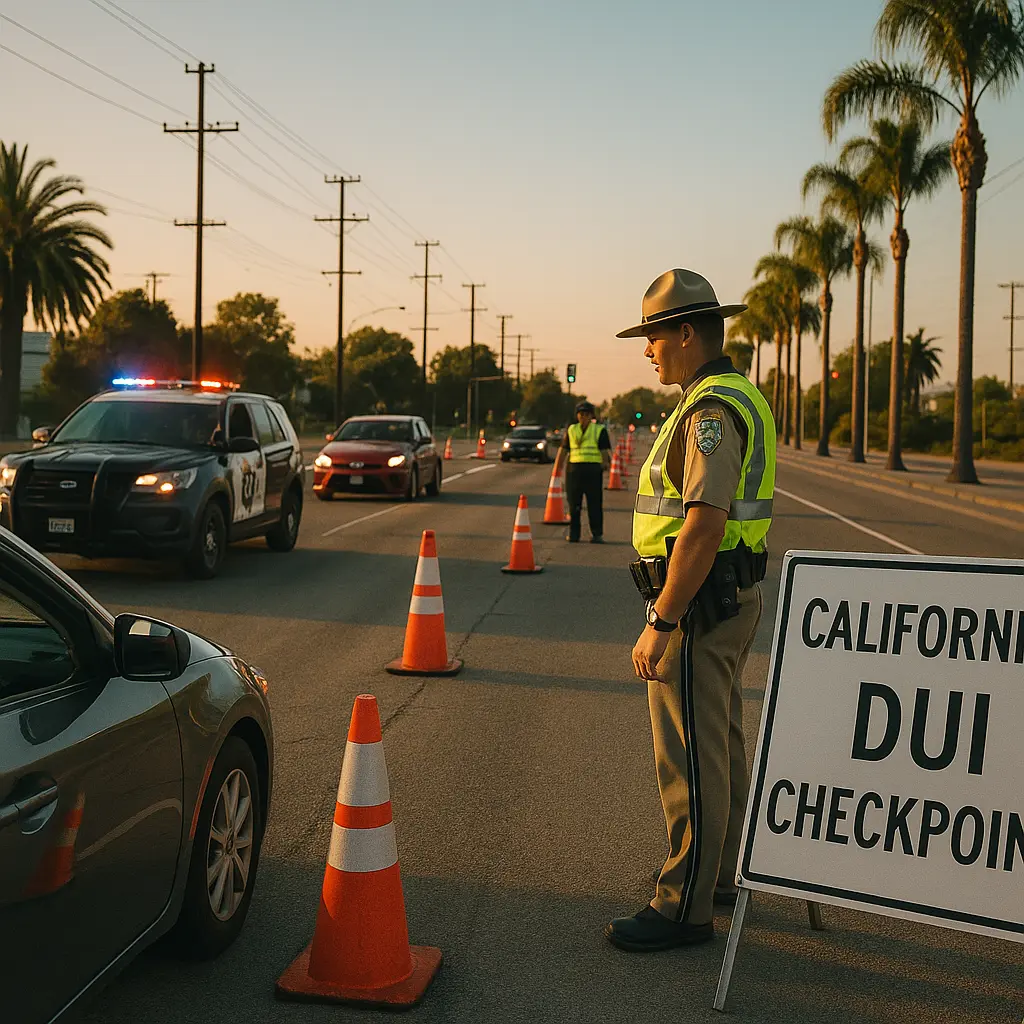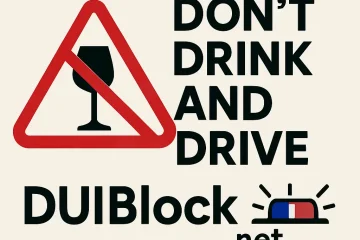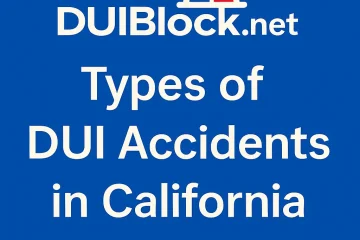DUI checkpoints, also known as sobriety checkpoints, are a common tool used by law enforcement across California to prevent impaired driving. If you’ve ever found yourself approaching one, you may have wondered: Is this even legal? Don’t I have rights under the Constitution?
The answer is yes — DUI checkpoints are legal in California — but only when conducted under strict legal guidelines. This article will walk you through the key laws, constitutional issues, and your rights at these checkpoints in 2025.
Are DUI Checkpoints Legal Under the U.S. Constitution?
DUI checkpoints raise questions about the Fourth Amendment, which protects against “unreasonable searches and seizures” by the government. According to Cornell Law School’s Fourth Amendment page, police generally need a warrant or probable cause to stop you.
So how can DUI checkpoints be legal?
In the 1990 U.S. Supreme Court case Michigan Dept. of State Police v. Sitz, the court ruled that the public interest in preventing drunk driving outweighs the minimal intrusion of a checkpoint. However, this is still controversial. As highlighted in this detailed article from HG.org, many legal scholars argue that such stops violate core Fourth Amendment protections.
Despite the controversy, DUI checkpoints are legal under federal law — and under California law as long as law enforcement follows specific requirements.
California Law on DUI Checkpoints
California formally recognizes DUI checkpoints as legal, provided they comply with legal guidelines. The case that established this in California is Ingersoll v. Palmer (1987). More recently, California Vehicle Code Section 2814.2 reinforces this legality:
“A driver of a motor vehicle shall stop and submit to a sobriety checkpoint inspection conducted by a law enforcement agency…”
— Cal. Veh. Code § 2814.2
This means you must stop if directed to do so at a legally sanctioned checkpoint.
Requirements for a Legal DUI Checkpoint in California
Under California law and court precedent, DUI checkpoints must meet eight legal criteria to be considered constitutional and valid:
-
Decision-Making by Supervisors
High-ranking officers must plan the checkpoint—not field personnel. -
Neutral Criteria for Stops
Officers must stop vehicles based on a formula (e.g., every third car), not at random. -
Reasonable Location
The checkpoint must be located in an area with a history of DUI-related incidents or accidents. -
Time and Duration Must Be Reasonable
Most checkpoints occur between 9 PM and 2 AM, when DUI activity is highest. -
Clear Markings and Notice
Signs, lights, and visible law enforcement presence must clearly identify the area as a checkpoint. -
Minimal Detention
Stops should be brief—just long enough to assess if a driver is impaired. -
Advance Public Notice (If Possible)
While not required by law, most agencies post advance notice to help validate the legality of the checkpoint. -
Well-Trained Officers
Officers must be trained to follow standardized procedures. For example, field sobriety tests must be administered correctly. See California’s guide to FSTs here.
Can You Legally Avoid a DUI Checkpoint?
Yes, but only if you do so legally. You’re allowed to make a legal U-turn or take a different street to avoid a checkpoint. However, if you commit a traffic violation while doing so, police can stop you.
Avoiding a checkpoint is not illegal by itself, but reckless or suspicious behavior could give officers reasonable suspicion to investigate further.
What Happens at a DUI Checkpoint?
Here’s what typically occurs at a checkpoint:
-
Initial Stop: An officer will ask for your license, registration, and insurance.
-
Observation: They look for signs of impairment—bloodshot eyes, slurred speech, alcohol odor.
-
Questions: You are not required to answer questions like “Where are you coming from?”
-
Field Sobriety Tests: If impairment is suspected, you may be asked to perform FSTs. Learn more about these tests here.
-
Breathalyzer or Arrest: If probable cause exists, a chemical test or arrest may follow.
What Are Your Rights at a DUI Checkpoint?
Even at a checkpoint, you are protected by the U.S. Constitution and California law. Here’s what you should know:
-
You do not have to answer incriminating questions.
-
You can record the interaction, as long as you’re not interfering.
-
You may refuse field sobriety tests before an arrest (though this might increase suspicion).
-
You can ask if you are free to go if you’re not being detained or arrested.
If you are arrested, California law considers driving under the influence causing injury to be a felony under Vehicle Code Section 23153, which carries serious penalties.
Legal Defenses Against DUI Checkpoint Arrests
If you were arrested at a DUI checkpoint, a skilled attorney can challenge:
-
Whether the checkpoint met the legal criteria
-
How the stop was initiated
-
Whether probable cause existed for further testing
-
The validity of field sobriety or breath tests
Evidence collected at an unconstitutional or improperly conducted checkpoint can be suppressed in court.
Conclusion: Know the Law, Protect Your Rights
DUI checkpoints are legal in California, but only when police follow strict rules. If you’re stopped at one, understanding your rights under the Fourth Amendment and California law could protect you from unlawful search, detention, or arrest.
If you believe your rights were violated, consult with a DUI attorney immediately. Legal outcomes can depend on how well the checkpoint was conducted—and whether your constitutional rights were respected.
Frequently Asked Questions (FAQs)
1. Are DUI checkpoints legal in California?
Yes. DUI checkpoints are legal in California under both state and federal law, as long as they follow specific legal guidelines established by cases like Ingersoll v. Palmer and codified in Vehicle Code § 2814.2.
2. Do DUI checkpoints violate the Fourth Amendment?
Not if properly conducted. While the Fourth Amendment protects against unreasonable searches, the U.S. Supreme Court has ruled that DUI checkpoints can be constitutional if they meet certain safeguards. Still, some experts argue otherwise, as seen in this HG.org article.
3. Do you have to stop at a DUI checkpoint?
Yes. California law requires drivers to stop when law enforcement directs them at a checkpoint. Failing to stop is a violation of Vehicle Code § 2814.2.
4. Can you refuse to answer questions at a DUI checkpoint?
Yes. You have the right to remain silent and are not required to answer questions such as “Where are you coming from?” or “Have you been drinking?” Politely declining to answer is legal.
5. Can you legally avoid a DUI checkpoint?
Yes. You may legally turn around or take an alternate route to avoid a checkpoint—as long as you obey all traffic laws. Illegal maneuvers can give officers probable cause to stop you.
6. Are DUI checkpoints required to be announced ahead of time?
No. Advance notice is not required by law, but most agencies provide it voluntarily to help legitimize the checkpoint in court.
7. How long can police detain you at a checkpoint?
Legally, officers can only detain you for a brief period, typically 30 seconds to 2 minutes. Unnecessary delays could be grounds for challenging the stop’s legality.
8. Can I refuse a field sobriety test at a checkpoint?
Yes. Field sobriety tests (FSTs) are voluntary in California unless you’re on DUI probation. Learn more about FSTs at California-DrunkDriving.org.
9. What if I refuse a breathalyzer test?
If you’re not under arrest, you can refuse a preliminary alcohol screening (PAS). But if you’ve been lawfully arrested, refusing a chemical test violates California’s implied consent law and can result in license suspension and harsher penalties.
10. Can police search your vehicle at a DUI checkpoint?
Not without probable cause. A checkpoint does not give officers automatic authority to search your car. They need a specific reason—like visible alcohol, drugs, or erratic behavior.
11. What happens if you’re arrested at a DUI checkpoint?
You will be taken into custody, and your vehicle may be impounded. Charges can range from misdemeanor DUI to felony DUI with injury, per Vehicle Code § 23153.
12. Can a DUI checkpoint be set up anywhere?
No. The location must be reasonable and justified, usually based on DUI-related data. Setting one up in an arbitrary or low-risk area may render it unconstitutional.
13. Can I record police at a DUI checkpoint?
Yes. You have the right to film or record police interactions, as long as you do not interfere with their duties or create a safety hazard.
14. Are there legal defenses if I’m charged from a DUI checkpoint?
Yes. Common defenses include:
-
The checkpoint was illegally set up
-
Officers didn’t follow procedures
-
You were unlawfully detained
-
Field or chemical tests were mishandled
A DUI defense attorney can help you challenge the evidence.
15. Can DUI checkpoint arrests be dismissed?
Potentially, yes. If the checkpoint violated any part of California law or the Fourth Amendment, your attorney may be able to get the charges reduced or dismissed entirely.



